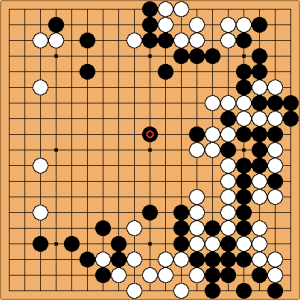All Hail the New Computer Go Master
Posted by Rampant Coyote on January 12, 2017
 Man, I remember spending weeks obsessing over how to write the ultimate Go playing program that would do this. It looks like Google’s Go-playing program, an updated version of the tournament winner from a few months ago, has used a stealth approach to become the unofficial champion… masquerading as a human player in online play. It has even defeated the reigning world champion, winning 60 out of 60 games during its run.
Man, I remember spending weeks obsessing over how to write the ultimate Go playing program that would do this. It looks like Google’s Go-playing program, an updated version of the tournament winner from a few months ago, has used a stealth approach to become the unofficial champion… masquerading as a human player in online play. It has even defeated the reigning world champion, winning 60 out of 60 games during its run.
Humans Mourn Loss After Google Is Unmasked as China’s Go Master
These were unofficial games during the testing process, so crowning a computer as the grandmaster of Go isn’t official yet, but… it’s basically over.
The interesting thing here is how wildly creative (within the limited field of Go) the software could be. As stated in the WSJ article:
“Master puzzled its human rivals by placing pieces in unconventional positions early in the game and changing tactics from game to game. Sometimes Master skirmished with its opponent across the whole board, while other times it relinquished territory with hardly a fight. Master’s record—60 wins, 0 losses over seven days ending Wednesday—led virtuoso Go player Gu Li to wonder what other conventional beliefs might be smashed by computers in the future.”
I remember how science fiction shows and stories in the 1970s and 1980s often portrayed humans as superior to computers because of our creativity and willingness to think outside the box. We’d confuse the computer controls in these stories with erratic actions that seemed illogical on the surface but were truly cunning underneath. With the limited computing power of that era, that seemed reasonable.
I guess now we’re the ones getting schooled by the computer in outside-the-box thinking. Sort of like a digital Ender Wiggins from Ender’s Game, the new software comes to the table with a lack of preconceived notions of how things are supposed to be done, and tackles the problem by observation, pattern recognition, prediction, and logic. It’s a little scary to consider, but also pretty cool.
It would be easy to both over-generalize or underestimate this achievement. The software that fueled the Jeopardy-winning Watson has saved lives diagnosing patients in medical systems. At least one person has died because they were over-reliant on their car’s automated driving abilities. The incredibly complex software behind the “brains” of these systems are only as good as their ability to understand and model their problem domain… which, in the real world, is a lot more complex than even we humans understand it.
While games like Chess were bound to a very limited problem space and was thus subject to a lot of “brute-force” techniques, this limited its applicability in the real-world. Go is a far less bounded problem, which is why it took another twenty years for it to reach this point. This victory doesn’t mean an open-ended world of computer intelligence or anything like that. But it does open the way for a lot of very powerful tools that might on this technology that can help us come up with better real-world solutions in all kinds of fields.
That is pretty exciting to me.
Filed Under: General - Comments: 3 Comments to Read
McTeddy said,
Oh, I heard about this!
The quotes from those Go players have been amazing:
“Go is far beyond the simplicity we imagined – a huge space is still out there for us humans to explore,” Nie said in an interview. “AlphaGo or Master, they are sent to lead our way by the god of Go.”
and
“Humans have been practicing and playing Go for thousands of years, but the computer now tells us that we are all wrong,”
I know that I’m little more than a beginner in the game of Go but this whole story has my jaw on the floor. I’m excited, amazed and a little bit terrified of whats to come.
Darius said,
This is so neat.
Also it’s a great example to show why we need to be careful with AI. A smart AI is very likely to start doing weird things we wouldn’t have predicted, like here. And if we give one some control over a potentially dangerous domain, we could be in trouble.
Rampant Coyote said,
Yeah. We could end up with SkyNet pretty quickly that way.